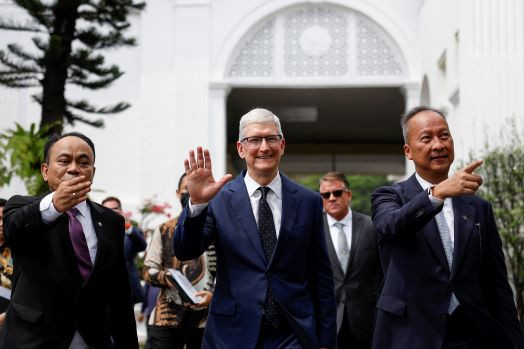COMMENTARY: What does Trump’s win mean for the Indonesian economy?
Change Size
 Economic engine: President Joko "Jokowi" Widodo delivers remarks at the 2016 Indonesia Infrastructure Week in Jakarta on Wednesday. The President has shared his optimism that the country will reach its economic growth target this year despite the slowdown in the third quarter. (JP/Anton Hermansyah)
Economic engine: President Joko "Jokowi" Widodo delivers remarks at the 2016 Indonesia Infrastructure Week in Jakarta on Wednesday. The President has shared his optimism that the country will reach its economic growth target this year despite the slowdown in the third quarter. (JP/Anton Hermansyah)
A
fter Donald Trump’s shocking presidential win, the US and the world are trying to grasp what it will mean. Some have dubbed the event a bigger shock than Brexit. Aside from the elevated risks to the US economy, what does it mean for Indonesia?
The US stock market rebounded after the initial sell-off on the news that Trump had won. The winners were banks and pharmaceuticals. Banks will thrive on a friendlier White House. Pharmaceutical companies are happy to be rid of pressures of price-fixing from the Democrats. Defense stocks soared on planned larger armed forces spending. Meanwhile, the treasury market also rose from the earlier sharp decline. The pattern of sell-off then rebound also took place after the June 2016 Brexit decision. But does it mean all is well?
Trump’s acceptance speech appears to have calmed frayed nerves, and governing is usually less poetic than campaigning. The recent precedent of an inexperienced president guided by senior statesmen can appear under control. Remember George W. Bush? If you think his leadership was fine, think again. His eight years in office saw the Iraq invasion and the global financial crisis. Lax financial regulations and rising deficit were the bases of the 2008 meltdown.
Trump’s campaign platform is scary, despite being vague. His fiscal proposal promises tax cuts with more spending. The tax cuts will amount to a revenue fall of US$6.2 trillion over the next decade. Combined with his spending plan, government debt will rise from 77 percent of gross domestic product (GDP) today to 105 percent in the next 10 years. No wonder the 30-year US bond price plunged and yields went up around 0.2 percent in one day. This will be a big game shifter in global finance. Rising long-term interest will raise the cost of borrowing, not just in the US but globally as well.
In monetary policy, Trump has commented that the current US Federal Reserve governor is too dovish. This amounts to public intrusion into what should be an independent monetary authority. Independence is its main basis for credibility. Many governments have tried to steer monetary policy, but usually behind closed doors. Being overt about it creates problems between the executive branch and the central bank.
For the Fed’s move to raise rates in December, the fundamentals are in place. These are improving GDP growth, lowering unemployment and rising inflation. But, if market turbulence remains worrying, it might delay the hike.
The most conscerning aspect of Trump’s platform is trade and globalization in general. It is likely that he will revisit several trade agreements. This signals a rise in protectionism. Closing the US economy as the largest global market means even lower global trade and growth. This could be the straw that breaks the camel’s back, plunging the world into recession within a year.
Trump’s campaign also looks to reduce the US military presence worldwide. That would allow Russian President Vladimir Putin and China more room to maneuver in Europe and Asia. The instability this would cause is anathema to trade and investment in Asia.
What does it mean for emerging markets and Indonesia?
Trade has been the engine of growth for emerging markets. A trade slowdown is bad news for exporters such as China and South Korea. The same applies to commodity producers, like Indonesia and Brazil. The US’ plan to raise its oil production is an extra blow, which could lower the global oil price further and other commodities with it.
What happens in the US will affect us through financial market contagion. The already expensive Indonesian equity market could face downward pressure. Rising US interest rates mean emerging market bonds are not attractive at present yields. Both will put pressure on the currency.
Only later, when things have settled down, can we expect investors to adopt a risk-on strategy. Then they will become more discriminatory about which emerging economies to bet on. Indonesia and India could be safe bets. Both are embarking on the overhaul of staid bureaucracy and massive infrastructure buildup. Both have large domestic markets with a young population. These factors bode well for longer-term growth potential.
The surprise Trump victory resulted in sudden negative moves in the market, which then changed direction, as is its wont, but the longer term trends are worrying. First is the potential rise in US deficits. The resulting rise in interest rates means a great deal on global finance.
More worrying is the likely US pullback from world trade. Add this to Brexit and you have more fire in the anti-globalization movement.
For Indonesia, the immediate impact is on direct exports to the US, like edible oil. Another impact channel is through the currency and financial markets. With already expensive equity valuation and low bond yields, the risk is a correction. Still, long-term investors in both markets appear confident in Indonesia’s prospects.
Let us also hope the financial market correction takes place in an orderly fashion. Being vigilant is even better than just crossing our fingers.
______________________
The writer is chief economist of PT Danareksa. The views expressed are his own.









